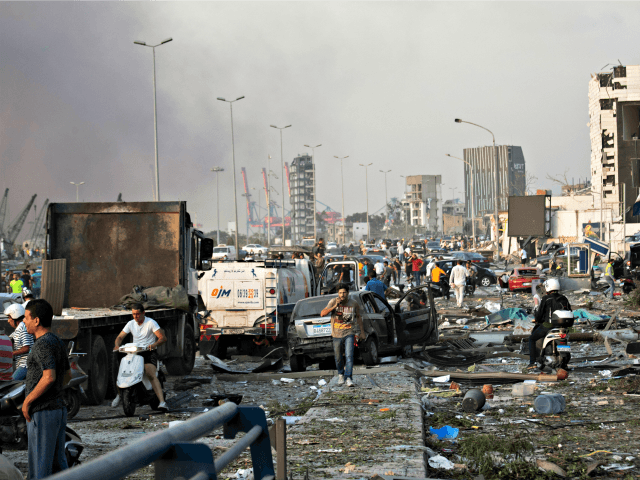Iran’s state-run Fars News Agency quoted “experts” on Wednesday who said the massive explosion in Beirut, currently deemed an accident by Lebanese officials, bears a suspicious resemblance to “Israeli-style operations in the past.”
Most of the Fars article lamented the humanitarian tragedy of the Tuesday explosion, the economic damage it will inflict, and the potentially dire consequences for Lebanon’s tottering government. The Iranian agency never elaborated on the allegations loosely flung at Israel by unidentified “experts” in an early paragraph:
While government officials have said they are investigating the cause of the blast that started in an adjacent warehouse where a large cargo of fireworks was stored, experts say the blast resembles Israeli-style operations in the past. Speculations that Israel could have been behind the catastrophic explosion reinvigorate as analysts worldwide believe that Tel Aviv is the number one beneficiary of the incident. An Israeli party leader even came to publicly thank God for gifting the Jews with such a present on their eve.
The latter statement was most likely a reference to former Israeli parliamentarian Moshe Feiglin, who wrote a Facebook post on Tuesday that described the Beirut explosion as a “spectacular pyrotechnics show” and celebrated it because he believes the true source of the blast was a hidden Hezbollah weapons depot.
“You don’t really believe this was just a messy fuel depot, right? You do realize that this inferno was supposed to land on us as a rain of rockets?” Feiglin wrote, stating his own experience with explosives leads him to believe the “mushroom cloud resembling a nuclear blast” marked the destruction of “around 200,000 missiles that could reach any strategic point in Israel.”
Feiglin, therefore, celebrated the alleged destruction of terrorist weapons as a “wonderful celebration in honor of the day of love,” referencing the Jewish holiday of Tu B’Av that was observed on Tuesday.
The leader the libertarian nationalist Zehut Party, Feiglin has yet to win a seat in Israel’s Knesset under that banner, is hardly the only person to suspect Hezbollah weapons played some role in the Beirut blast, but few of the others publicly celebrated a catastrophe that has killed at least a hundred people and injured thousands of others.
In addition to theories about hidden weapons caches exploding at the Port of Beirut, some analysts theorize the ammonium nitrate fertilizer itself was a weapon, citing the Lebanese terrorist group and political party Hezbollah’s history of stockpiling the substance to manufacture bombs.
The Times of Israel reviewed some of those theories on Wednesday and noted that not even Hezbollah itself seems to believe the Beirut explosion was caused by Israeli covert action, as the Fars article insinuated.
After lamenting the damage from the explosion in Beirut, Fars concluded by blaming the United States for the calamity in addition to Israel:
All of this should also be understood in a broader context that also involves Western involvement, namely by the US, which is busy serving to suffocate the country through illegal sanctions and restrictions. Last month, Iranian cargo ships carrying food, medicine and fuel — all crucial to Lebanon during the crisis — were illegally halted under pressure from the United States and its allies.
The Caesar Act, a wide-ranging illegal US sanction regime placed against Syria, has also negatively impacted much of the trade between the two neighboring states, which will continue to bleed Lebanon’s foreign currency reserves.
If nothing else has proven that the United States is the reason why Lebanon is suffering, the August 4 tragedy surely has. The monumental tragedy for the Lebanese people is set to continue as the US refuses to stop meddling in Lebanon’s internal affairs and allow the government to operate properly for the common good of its people.
The Ceasar Syria Civilian Protection Act, signed into law by President Donald Trump in December 2019, sanctions officials of the Syrian regime who are found responsible for human rights violations, including arbitrary detention, torture, sexual violence, and population displacement. The “Caesar” referred to in the name of the bill is the alias used by a Syrian photographer who smuggled pictures documenting the abuse of prisoners out of Syria.
The U.S. Treasury Department has designated 39 individuals and entities for sanctions under the Caesar Act, including Syrian dictator Bashar Assad and his wife Asma. The sanctions target the immense personal wealth of these individuals, much of it accumulated through war profiteering.
As Fars indicated, Iran is angry about the Caesar Act because it expected a windfall of profits from reconstruction in return for supporting the Assad regime during the Syrian civil war. All of the entities sanctioned to date under the Caesar Act were involved in reconstruction bids.
As the Washington Post noted when Caesar Act sanctions went into effect, the economic crisis in Lebanon was not caused by the Act, or by previous U.S. and European sanctions, contrary to efforts at assigning such blame by the regimes in Damascus and Tehran. If anything, Assad’s brutal war against his own people brought the Lebanese economy to the brink of crisis. Lebanon’s economic collapse was, in turn, a major reason for the crash of the Syrian currency.
The legality of the Caesar Act has been rhetorically challenged, on the grounds that “secondary sanctions” affecting entities which are not doing business with American entities should generally be considered violations of international law, and some threats to file suit against it, but there have not been any effective court challenges so far.

COMMENTS
Please let us know if you're having issues with commenting.